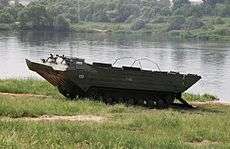PTS (vehicle)
| PTS-M | |
|---|---|
|
| |
| Overview | |
| Manufacturer | Soviet State Factories |
| Production | begun 1965 |
| Assembly | Soviet Union |
| Body and chassis | |
| Class | tracked amphibious transport |
| Body style | waterproofed hull |
| Layout | front engine (under floor), front drive sprocket[1] |
| Powertrain | |
| Engine | A-712P V12 water-cooled diesel (PTS) or V-54P V12 water-cooled diesel (PTS-M) |
| Transmission |
water: PTO propeller drive |
| Range | 300 km (190 mi) |
| Dimensions | |
| Length | 11.52 m (37 ft 10 in)[1] |
| Width | 3.32 m (10 ft 11 in) |
| Height | 2.65 m (8 ft 8 in) |
| Curb weight | 17,700 kg (39,000 lb) |
The PTS is a Soviet tracked amphibious transport. PTS stands for Plavayushchij Transportyer - Sryednyj or medium amphibious transport vehicle. Its industrial index was Ob'yekt 65.
Introduced in 1965,[1] it is large, with a substantial payload of 10 tons, two to four times the capacity of the BAV 485, and better cross-country performance, at the cost of greater somewhat higher purchase costs because it is tracked. The most common model is the improved PTS-M that is powered by a 350 hp diesel engine.
It has a boxy, open watertight hull, with six road wheels per side,[1] front drive sprocket,[1] rear idler sprocket, and no return rollers. Like the BAV 485, and unlike the DUKW, it has a rear loading ramp. The crew is seated at the front, leaving the rear of the vehicle open for a vehicle, which can be driven (or backed) in, rather than lifted over the side. To aid in facilitating this, the engine is under the floor.[1]
Propulsion in water is by means of twin propellers, in tunnels to protect them from damage during land operations.[1]
The PTS-M was adopted by the Soviet Army and Warsaw Pact forces,[1] and has been supplied to Egypt,[1] the former Yugoslavia, Iraq, Uruguay, and other nations.


The PTS-M also has a companion vehicle, the PKP, a boat-like amphibious two-wheeled trailer, with fold-out sponsons providing stability on water;[1] the combination allows the PTS-M to accommodate an artillery tractor, field gun (up to medium caliber),[1] its crew, and a quantity of ammunition, all in one load.[1]
In 2014, the Russian Defense Ministry intends to purchase an undetermined number of PTS-4s, which underwent acceptance trials in 2011. The vehicle will be fitted with a remotely operated 12.7 mm (0.50 in) machine gun and a multi-fuel engine. The PTS-4 weighs 33 tons, with a payload of 12 tons on land (18 tons on water). Projected maximum road speed is 60 km/h (37 mph), with an expected maximum speed in water of 15 km/h (9.3 mph).[2] Unlike its predecessors, it uses T-80 suspension components. The fully enclosed cab offers protection against small arms fire and splinter. Production is expected to begin in 2014.[3]
Specification
- Rear axle clearance:
- Ground clearance:
- Front track:
- Rear track:
- Turning radius:
- Maximum speed (loaded, highway): 40 km/h (25 mph)
- Tyres:
- Fuel tank capacity:
- Fuel consumption:
- Top speed: 40 km/h (25 mph) (road)
(water) - Range: 300 km (190 mi)
Variants
- PTS-2
- PTS-3
- PTS-4
References
Notes
- 1 2 3 4 5 6 7 8 9 10 11 12 Hogg, Ian V., and Weeks, John. The Illustrated Encyclopedia of Military Vehicles. (London: Hamblyn Publishing Group Limited, 1980), p.309, "PTS Tracked Amphibian".
- ↑ Technical data of PTS-4 in russian http://www.transmash-omsk.ru/node/241
- ↑ Russian Defense Ministry to buy new amphibious tracked armoured vehicle PTS-4 in 2014 - Armyrecognition.com, 24 July 2013
Sources
- Hogg, Ian V., and Weeks, John. The Illustrated Encyclopedia of Military Vehicles, p. 309, "PTS Tracked Amphibian". London: Hamblyn Publishing Group Limited, 1980.